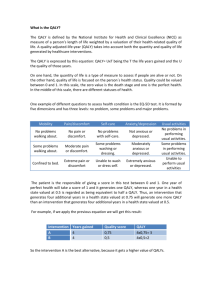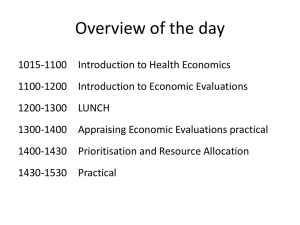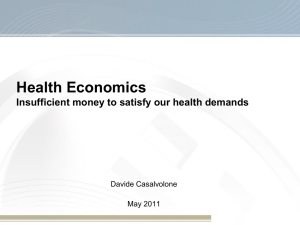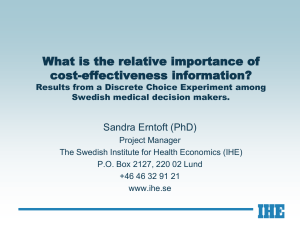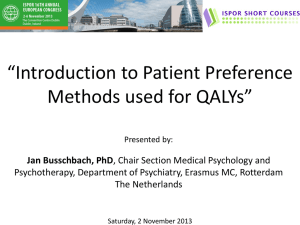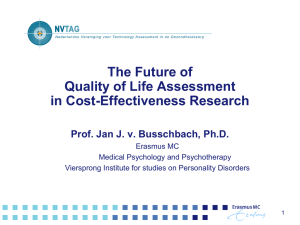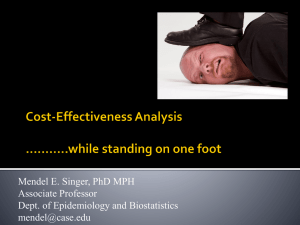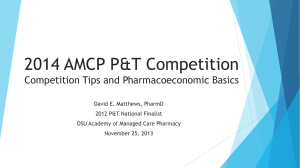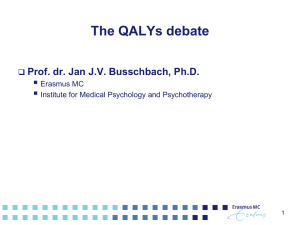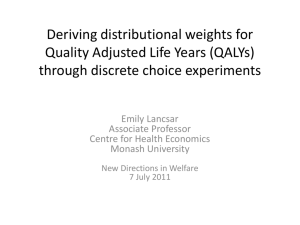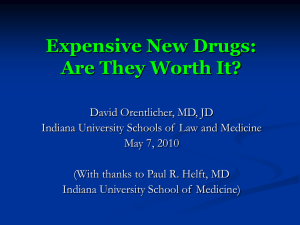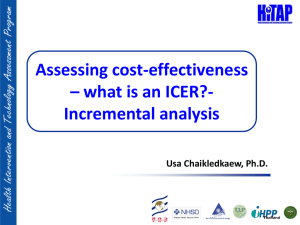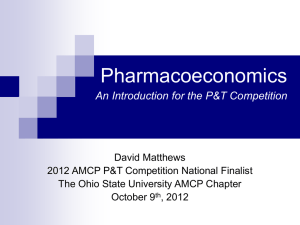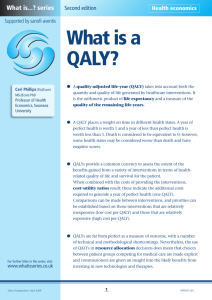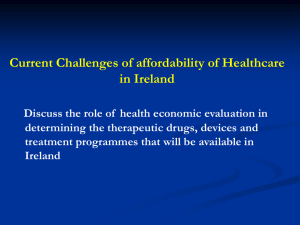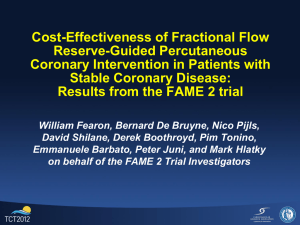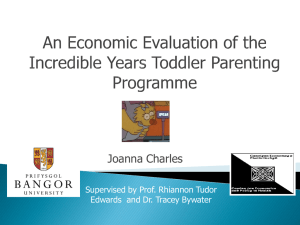Clinical Quality of life assessment
advertisement
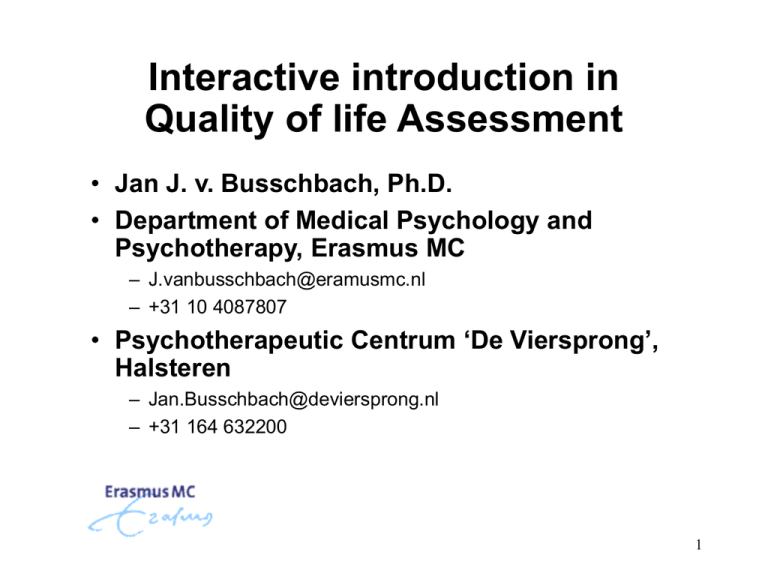
Interactive introduction in Quality of life Assessment • Jan J. v. Busschbach, Ph.D. • Department of Medical Psychology and Psychotherapy, Erasmus MC – J.vanbusschbach@eramusmc.nl – +31 10 4087807 • Psychotherapeutic Centrum ‘De Viersprong’, Halsteren – Jan.Busschbach@deviersprong.nl – +31 164 632200 1 New cancer therapy Symptoms Drug X Drug Y Survival days Days sick of chemotherapy Days sick of disease TWiST 300 10 100 190 400 150 30 220 2 Time Without Symptoms of disease and subjective Toxic effects of treatment • TWiST – Developed by Gelber (statistician) • In search for a typical “cancer” problem – Often prolonged life but also a reductions in quality of life » At the beginning (side effects) » At the end – Only count the days without symptoms of disease and subjective toxic effects of the treatment 3 TWiST ignores differences in quality of life • TWiST – Healthy = 1 – Sick (dead) = 0 • There is more to life than sick/health – Make intermediate values – Q-TWiST » Quality of life adjusted adjusted TWiST • How to scale quality of life? • What is Quality of life? 4 Quality of life • “…. Health is physical, mental and social wellbeing and not merely the absence of disease or infirmity...” – World Health Organization, 1947 • Extending health to well-being: Quality of life • What is the definition of quality of life? Definitions of Quality of Life • • • • • Quality of life is the degree of need and satisfaction within the physical, psychological, social, activity, material and structural area (Hörnquist, 1982). Quality of life is the subjective evaluation of good and satisfactory character of life as a whole (De Haes, 1988). Health related quality of life is the subjective experiences or preferences expressed by an individual, or members of a particular group of persons, in relation to specified aspects of health status that are meaningful, in definable ways, for that individual or group (Till, 1992). Quality of life is a state of well-being which is a composite of two components: 1) the ability to perform everyday activities which reflects physical psychological, and social well-being and 2) patient satisfaction with levels of functioning and the control of disease and/or treatment related symptoms (Gotay et al., 1992). An individual’s perception of their position in life in the context of the culture and values systems in which they live and in relation to their goals, expectations, standards and concerns (WHO Quality of life Groups, 1993). No clear definition because: • Many possible definitions – Multi-dimensionally – Subjective – Related to society • Researchers are free to choose – The notion of measuring the quality of life could include the measurement of practically anything of interest to anybody. And, no doubt, everybody could find arguments supporting the selection of whichever set of indicators to be his choice (Andrews & Withy, 1976, page 6) No clear definition because: • Different origins of research – Clinical decision making: Does the patient benefit from the treatment? – Epidemiology (public health): what is the morbidity of the population? – Health economics: Is it worth the money? 8 Common items in definitions: • Quality of life is subjective…. – “Given its inherently subjective nature, consensus was quickly reached that quality of life ratings should, whenever possible, be elicited directly from patients themselves. “ (Aaronson, in B Spilker (Ed): Quality of life and Pharmacoeconomics in Clinical Trails, 1996, page 180) Common items in definitions: • Health related • Multidimensional – Physical, psychological, social • Questionnaires – Standardize questions and response » Reproducible results: sciences » Quantify subjectivity • Operational defined – Like IQ and temperature. How to measure quality of life form a clinical point of view? • Choose items – Are you able to walk one kilometer ? – Do you feel depressed ? • Choose response mode – Binary – Multiple (Likert) – Continuous (Visual Analogue Scale) yes / no yes / at bid / hardly / no Always ————X—— Never • Combine items to dimensions of quality of life – Sum up the items belonging to one dimension – Rescale sum on a scale from 0 to 100 Quality of life form a clinical point of view: profiles 12 Can profiles help? (1) Symptoms Drug X Drug Y Survival days Days sick of chemotherapy Days sick of disease TWiST 300 10 100 190 400 150 30 220 13 Can profiles help? (2) • TWiST – Healthy = 1 – Sick (dead) = 0 • There is more to life than sick/health – Make intermediate values – Q-TWiST » Quality of life adjusted adjusted TWiST • How to scale quality of life? • What is Quality of life? 14 How to scale QoL for Q-TWiST? • One needs a uni-dimensional value of QoL – Like the IQ-test measures intelligence – Rules out multi-dimensional questionnaires • Ratio or interval scale – Difference between 0 and .8 must be 8 time higher than .1 • Four popular methods have these pretensions – Visual Analog Scale, Time Trade-Off, Standard Gamble, Person tradeoff • Plus validated questionnaires – HUI, EuroQol EQ-5D, 15-D, AQoL, etc 15 Value a health state • You are in a wheelchair • No pain or discomfort • No psychosocial problems 16 Visual Analogue Scale • VAS Normal health – Also called category scaling • From psychological research • “How is your quality of life today ?” • “X” marks the spot X – Response in centimeters – Rescale to [0..1] Dead 17 Time Trade-Off • TTO – Values Quality of Life in QALYs – Quality adjusted life years • Wheelchair – With a life expectancy: 50 years • How many years would you trade-off for a cure? – Max. trade-off is 10 years • QALY(wheel) = QALY(healthy) – Y * V(wheel) = Y * V(healthy) – 50 V(wheel) = 40 * 1 • V(wheel) = .8 18 Q-TWiST = QALY • When health (QoL) is valued in years – instead of of days…. • Q-TWiST = Quality Adjusted Life Years – QALYs • Q-TWiST invention of physicians • QALY invention of economists 19 Patient values include coping • Stensman Healthy – Scan J Rehab Med 1985;17:87-99. • Scores on a visual analogue scale – 36 subjects in a wheelchair – 36 normal matched controls • Mean score – Wheelchair: 8.0 – Health controls: 8.3 • The patient perspective does not work in Health economics Death 20 The general public should be informed… • Valuing without knowledge makes no sense – Thyroid Eye Disease • Give description of the disease A patient with bilateral thyroid eye disease with upper lid retraction and exophthalmos. 21 Which health care program is the most cost-effective? • A new wheelchair for elderly – – – – – – Increases quality of life = 0.1 10 years benefit Extra costs: $ 3,000 per life year QALY = Y x V(Q) = 10 x 0.1 = 1 QALY Costs are 10 x $3,000 = $30,000 Cost/QALY = 30,000/QALY • Special post natal care – – – – – Quality of life = 0.8 35 year Costs are $250,000 QALY = 35 x 0.8 = 28 QALY Cost/QALY = 8,929/QALY 22 QALY league table Intervention $ / QALY GM-CSF in elderly with leukemia 235,958 EPO in dialysis patients 139,623 Lung transplantation 100,957 End stage renal disease management 53,513 Heart transplantation 46,775 Didronel in osteoporosis 32,047 PTA with Stent 17,889 Breast cancer screening 5,147 Viagra 5,097 Treatment of congenital anorectal malformations 2,778 23 Implications shifting threshold • QALY are weighted • Weighted QALYs are maximized – Health is no longer the only thing maximized • Health status population will drop • Differences in health will drop – Egalitarian consideration are incorporated • Burden of disease becomes a criteria 24 Shifting threshold 70000 Cost per QALY 60000 20000 euro threshold Increase threashold 50000 40000 30000 20000 10000 0 0 0.8 0.6 0.4 0.2 dead Severity of disease in lost QALYs 25 Practice Proportional short fall Onychomycosis Osteoporosis Symptomatic BPH Hypertension High Cholesterol Arteriosclerosis COPD Pneumococcal pneumonia Pulmonary hypertension Non-Hodgkin Lymphoma 0.02 0.08 0.09 0.26 0.28 0.55 0.61 0.82 0.96 0.97 26 CE-ratio by equity 27 Conclusions • Quality of life can be valued in – Profiles » Psychometric approach – Unidimensional scaling » Health economics • Different perspective – Societal – Patient » Coping • Quality of life definition – Operational defined • Quality of life can moderate cost-effectiveness 28
